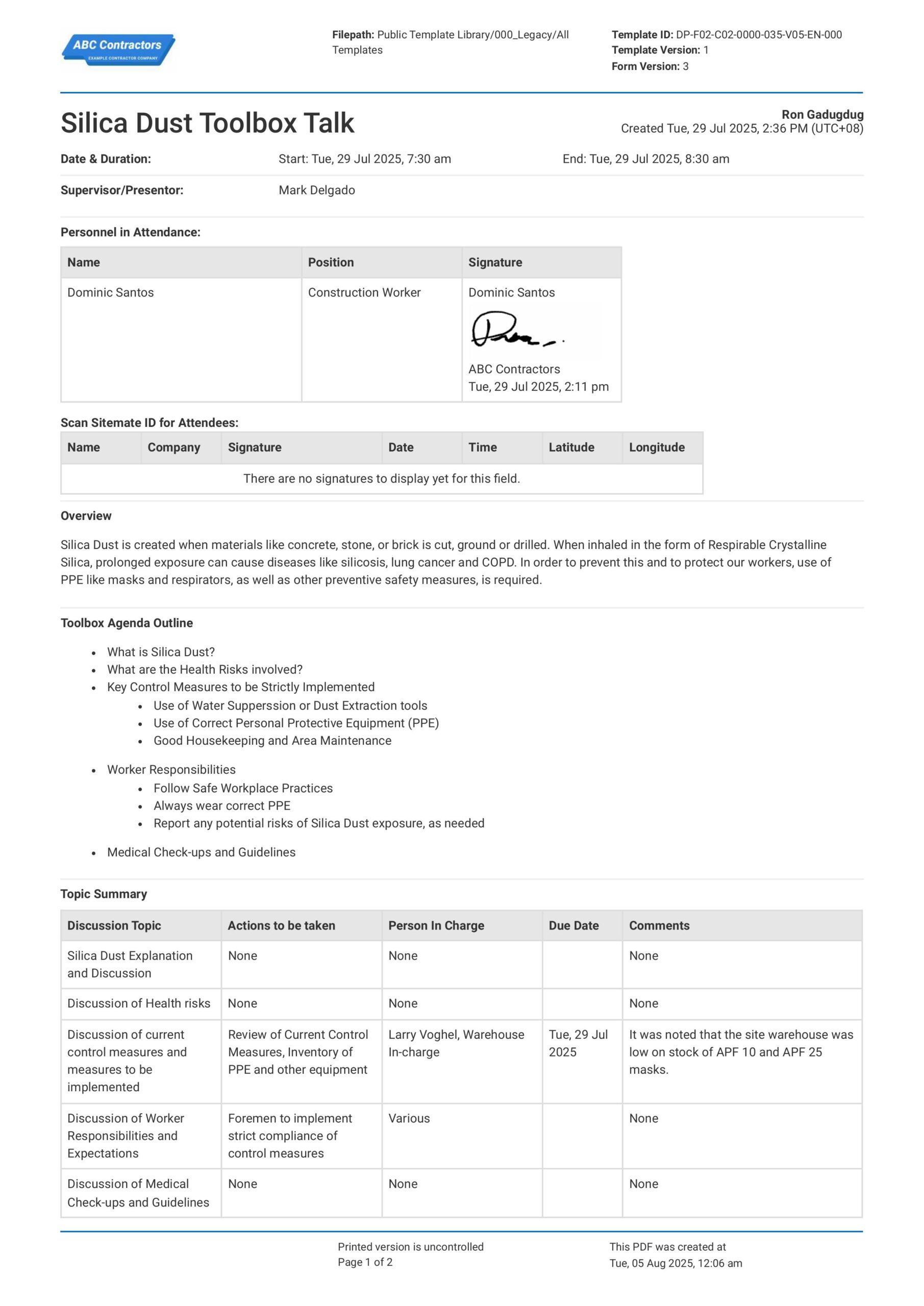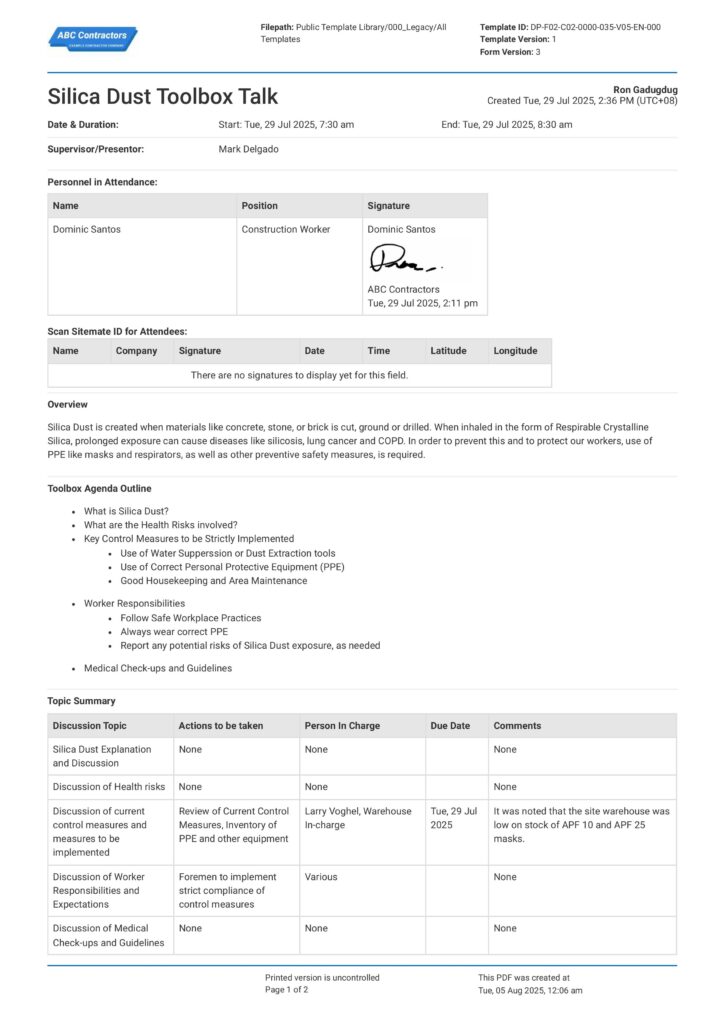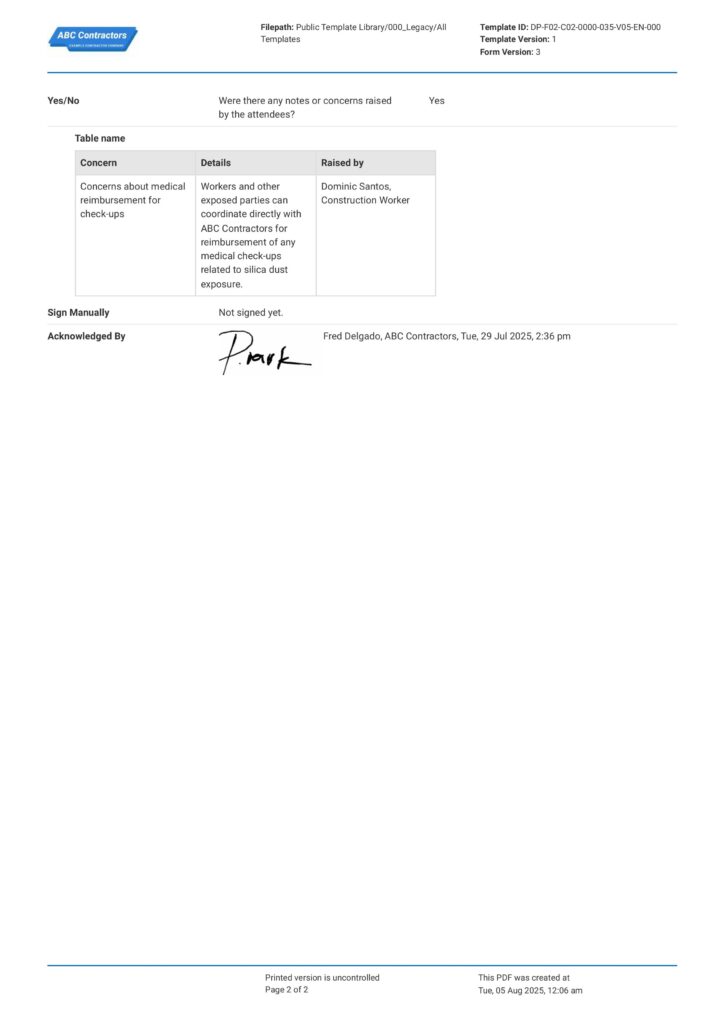Silica Dust Toolbox Talk Template
Start with a free 30-day trial. No credit card required.

~10,000 employees
~500 employees
~25,000 employees
~20 employees
~50 employees
~1,500 employees
~20 employees
What is a Silica Dust Toolbox Talk?
A Silica Dust Toolbox Talk is typically a short meeting focused on the topic of silica dust hazards in workplaces such as construction sites and manufacturing lines. Toolbox talks are usually done in the morning before a team starts work, and acts as an avenue for team managers to discuss any potential workplace hazards and safety procedures that may arise during the day.
The main purpose of a toolbox talk on silica dust is to raise awareness on what respirable crystalline silica is, how it is formed, and the effects of prolonged exposure to the human body. Further, a toolbox talk is where discussions on safe work practices and exposure control methods can be freely discussed, and where workers can raise questions or concerns regarding such methods.
Compare this toolbox talks silica dust template with other traditional formats
Use this Silica Dust Toolbox Talk template for free.
Is Silica Toxic to Humans?
Silica, formally named silicon dioxide, is typically a safe and non-toxic substance that makes up a large part of the earth’s crust. It is found in various materials and substances, like rocks, sand, and quartz, and is used in a wide range of applications such as construction materials, cosmetics. It is also a naturally occurring substance in many every-day food items, like whole grains, fruits, and vegetables. Skin contact and ingestion of silica has been found to be non-harmful to humans.
However, when silica is inhaled in the form of Respirable Crystalline Silica (RCS), it poses significant health risks to humans. RCS refers to silica in the form of fine microdust, that is formed when materials like stone or concrete is cut, drilled, or fractured. It is most commonly encountered in workplaces such as construction sites, stone quarries, or manufacturing lines.
The human body cannot naturally process or filter silica in its microdust form, and has no natural way of getting rid of the substance when inhaled. A build-up of silica dust in the lungs can lead to scarring of the lung tissue, also known as fibrosis, and can lead to severe diseases like silicosis, lung cancer, chronic obstructive pulmonary disease (COPD), and kidney disease. Studies have shown that this scarring of the lung tissue can even continue and worsen even after you are no longer exposed to silica dust, and cannot be easily treated and cured.
Are Toolbox Talks a Legal Requirement?
Most safety laws and safety institutions do not explicitly require toolbox talks to be performed. However, procedures like toolbox talks are still considered important as it demonstrates compliance with broader workplace safety requirements and obligations. The US Occupational Safety and Health Administration (OSHA) require that employers:
- Provide a safe working environment
- Ensure that work hazards and safety control procedures have been communicated to employees
- Ensure that employees have been given training on safe work practices
- Comply with safety standards and recommendations
- Keep records of safety trainings and other forms of communication
While Toolbox Talks are not explicitly required as a task that employers must perform, it demonstrates that the employer has performed their due diligence to communicate the potential hazards and health risks to their employees, and that the employers have acted in good faith and to the best of their ability to reinforce safety training and control measures.
The key benefit of holding a regular schedule for toolbox talks is that it promotes a culture of workplace safety and hazard awareness. It prepares workers for the day ahead, and refreshes them of any prior safety training in regard to the tasks assigned to them. Further, it acts as an avenue for team management to document this communication and awareness in the form of signed attendance sheets.
Frequently Asked Questions
Why is this the best Silica Dust Toolbox Template?
With Sitemate’s Silica Dust Toolbox Template, you can outline the agenda of your talk beforehand and re-use the template for all future talks. You can even note down questions, concerns, and actionable tasks raised during the talk, and take the attendance of the talk, all in one form.
Does this toolbox talk template comply with safety standards?
Yes, as required by OSHA, this template was built to help you to effectively communicate the hazards of silica dust and to document the awareness and communication to your team.
Will I be able to edit the template?
Yes, Dashpivot’s intuitive drag-and-drop template builder allows you to easily edit any part of the template to tailor-fit your company’s needs.
How can I access this toolbox template?
You can access this template on any device - your phone, tablet or desktop. Take this template to the site with you on your phone and fill it out on the go. Then you can access the same form again on your office desktop to edit, save, and export to PDF or CSV.
Other popular templates you can use and edit for free

Vehicle Safety Toolbox Talk Template
Documenting your vehicle safety toolbox talk has never been easier

Head Protection Toolbox Talk Template
Make documenting your head protection toolbox talks simpler

Minutes of the Meeting Template
Capture important notes from your meeting with this template
This toolbox talk form was generated with Dashpivot software
Make documenting your toolbox talks and other meetings easier - go digital with Dashpivot:
- Access, edit and complete toolbox talk forms from any device - mobile, tablet or computer.
- Print, download or send your toolbox talk forms as perfectly formatted PDF documents with your company logo.
- Store your toolbox talk forms securely online, where they can be searched and found in seconds
- Invite internal and external parties to see, edit and sign off on toolbox talk forms online.
Sitemate builds best-in-class software tools for built world companies.

